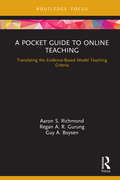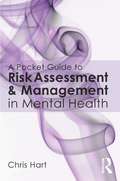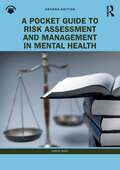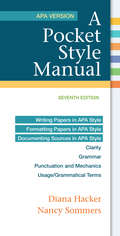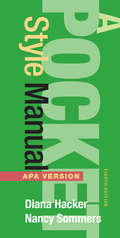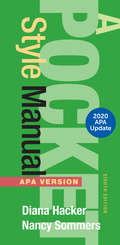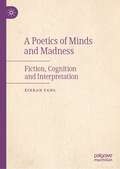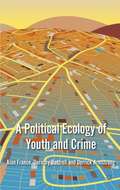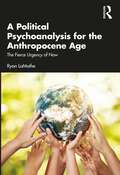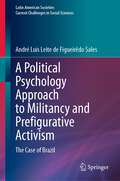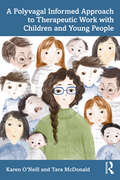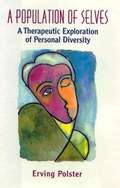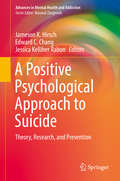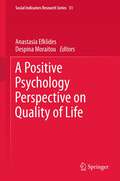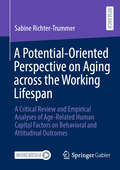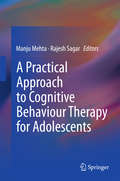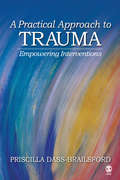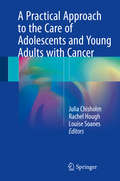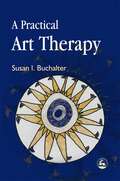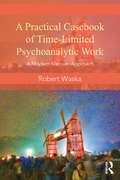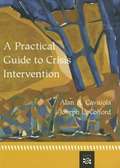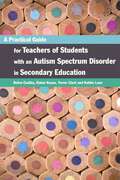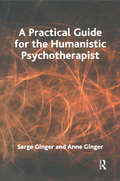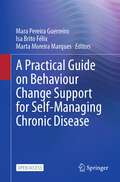- Table View
- List View
A Pocket Guide to Online Teaching: Translating the Evidence-Based Model Teaching Criteria
by Aaron S. Richmond Regan A. Gurung Guy A. BoysenThis pithy yet thorough book provides an evidence-based guide on how to prepare for online teaching, especially for those who are making a swift transition from face-to-face to online instruction. Guided by the Model Teaching Characteristics created by The Society for the Teaching of Psychology, this book covers important topics like: how to adapt to expected and unexpected changes in teaching, how to evaluate yourself and your peers, and tips on working smarter/optimizing working practices with the resources available. The features of the book include: Practical examples exploring how to solve the typical problems of designing and instructing online courses. Interactive "Worked Examples" and "Working Smarter" callouts throughout the book which offer practical demonstrations to help teachers learn new skills. Further reading and resources to build on knowledge about online education. End of chapter checklists which summarizes suggestions about how to be a model online teacher. This essential resource will provide support for teachers of all levels and disciplines, from novice to the most experienced, during the transition to online teaching.
A Pocket Guide to Risk Assessment and Management in Mental Health
by Chris HartRisk assessment and risk management are top of every mental health trust’s agenda. This concise and easy-to-read book provides an informative and practical guide to the process of undertaking a risk assessment, arriving at a formulation and then developing a risk management plan. Covering everything a practitioner may have to think about when undertaking risk assessments in an accessible, logical form, the book includes practice recommendations rooted in the latest theory and evidence base. Attractively presented, plentiful clinical tip boxes, tables, diagrams and case examples make it easy to identify key information. Samples of authentic dialogue demonstrate ways in which to formulate questions and think about complex problems with the person being assessed. A series of accompanying films, professionally made and based on actual case studies, are available on a companion website, further illustrate key risk assessment and management skills. This accessible guidebook is designed for all mental health professionals, and professionals-in-training. It will also be a useful reference for healthcare practitioners who regularly come into contact with people experiencing mental health problems.
A Pocket Guide to Risk Assessment and Management in Mental Health
by Chris HartRisk assessment and risk management are top of every mental health organisation’s agenda. This updated and expanded new edition provides an informative and practical guide to the process of undertaking a risk assessment, arriving at a risk formulation and developing a risk management plan. Covering everything a practitioner may have to think about when undertaking risk assessments in an accessible, logical form, the second edition of A Pocket Guide to Risk Assessment and Management in Mental Health includes new and expanded content on: risk formulation; working in forensic settings; specific mental health disorders; models of suicide and self-harm; and triage. It features practice recommendations rooted in the latest theory and evidence base, clinical tip boxes, tables, diagrams and case examples, along with samples of authentic dialogue which demonstrate ways to formulate questions and think about complex problems with the person being assessed. A series of accompanying videos, professionally made and based on actual case studies, are available on a companion website, further illustrating key risk assessment and management skills. This concise guidebook is designed for all mental health professionals, and professionals-in-training. It will also be a useful reference for all healthcare practitioners who regularly come into contact with people experiencing mental health problems.
A Pocket Style Manual
by Diana Hacker Nancy SommersYour students need clear, complete answers to their questions about grammar, research, and writing in the social sciences--and they often need them at a moment's notice. As their teacher, you are their greatest resource, but you can't be available 24/7. For help with work in class and at home and especially for questions at odd hours, students can turn to A Pocket Style Manual, APA Version. The APA version of A Pocket Style Manual provides help for students writing in disciplines that use APA style: psychology, sociology, economics, criminal justice, nursing, education, business, and others. With a focus on APA conventions and practices, examples and models from across the disciplines, and guidelines for integrating and documenting a wide variety of sources, A Pocket Style Manual, APA Version, gives concise, straightforward, and trusted advice for any writing situation.
A Pocket Style Manual
by Diana Hacker Nancy SommersBecoming a college writer means becoming a college researcher, and it can be a challenge for students to keep all of the guidelines and best practices straight for each class. Enter A Pocket Style Manual, APA Version. The eighth edition—with its emphasis on step-by-step how-to instruction that helps students apply writing, research , and citation advice in practical, transferable ways—is a powerful companion for writing in all disciplines. What’s more, it covers all aspects of writing in APA style, including over 100 APA documentation models and 11 sample student papers in diverse genres, from a literature review to a laboratory report to a professional memo. With Pocket’s new research help, tested and trusted grammar and style advice, and digital tools that make practice, tracking, and grading simple, you’ve got the most powerful pocket guide for college writing and research.
A Pocket Style Manual, APA Version
by Diana Hacker Nancy SommersBecoming a college writer means becoming a college researcher, and it can be a challenge for students to keep all of the guidelines and best practices straight for each class. Enter A Pocket Style Manual, APA Version. The eighth edition—with its emphasis on step-by-step how-to instruction that helps students apply writing, research , and citation advice in practical, transferable ways—is a powerful companion for writing in all disciplines. What’s more, it covers all aspects of writing in APA style, including over 100 APA documentation models and 11 sample student papers in diverse genres, from a literature review to a laboratory report to a professional memo. With Pocket’s new research help, tested and trusted grammar and style advice, and digital tools that make practice, tracking, and grading simple, you’ve got the most powerful pocket guide for college writing and research.
A Poetics of Minds and Madness: Fiction, Cognition and Interpretation
by XINRAN YANGThis monograph aims to explore the mind-narrative nexus by conducting a cognitive narratological study on the mad minds in fictional narratives. Set on the interface of narrative and cognitive science (cognitive linguistics, cognitive psychology and cognitive neuropsychology), it adopts an indirect empirical approach to the fictional representation of madness. The American writer Ken Kesey’s novel One Flew Over the Cuckoo’s Nest is chosen as the primary text of investigation, whereas due consideration is also given to other madness narratives when necessary. This book not only demonstrates the value of reading and rereading literary classics in the modern era, but also sheds light on the studies of cognitive narratology, cognitive poetics, madness narratives and literature in general.
A Political Ecology of Youth and Crime
by Derrick Armstrong Dorothy Bottrell Alan FranceThis book explores young people's 'nested' and 'political' ecological relationships with crime through an empirical investigation of the important 'places' and 'spaces' in young people's lives; in their social relationships with peers and family members; and within formal institutional systems such as education, youth justice and social care.
A Political Psychoanalysis for the Anthropocene Age: The Fierce Urgency of Now
by Ryan LaMotheA Political Psychoanalysis for the Anthropocene Age presents an evaluation of the politics of climate change and considers how psychoanalysis can contribute to this discourse. Presented in two parts, the book first uses a psychoanalytic approach to interrogate political-economic realities and their impact on shaping Western political selves in the Anthropocene age. Ryan LaMothe identifies core illusions of the Western psyche and how they shape behavior and relations, as well as how they are implicated in various emotional responses to climate change like eco-mourning and eco-denial. Topics such as political dwelling, sovereignty, political violence and change, climate obstacles such as capitalism, nationalism, and imperialism, and the problem of hope are explored using psychoanalytic and philosophical perspectives. LaMothe then considers the role of psychoanalysis in the public-political realm, as well as how a psychoanalytic political perspective invites reforming the education and practice of psychoanalysis. A Political Psychoanalysis for the Anthropocene Age will be thought-provoking reading for psychoanalysts and psychotherapists, as well as anyone interested in the politics of climate change.
A Political Psychology Approach to Militancy and Prefigurative Activism: The Case of Brazil (Latin American Societies)
by André Luis SalesThis book frames a series of protests occurred in Brazil from 2013 to 2016 as exemplary cases of global trends in contentious politics to analyze the tension between two forms of collective action: the militant (militante) and the prefigurative activist (ativista). Building on sociology, political science, and psychology, it explores the relationship between protestors' activities and conceptions of political participation with their subjectivity and agency. The protest cycle triggered by the June 2013 events in Brazil gave strength and popularity to repertoires and strategies of collective action uncommon and innovative. Those praxes defied political parties' conventions, highlighted the limitations of militant unionist tradition, and brought prefigurative activism to the Brazilian left-wing agenda. In this book, Andre Luis Leite de Figueirêdo Sales combines theoretical tools and traditions from South and North America to build an interdisciplinary approach to Political Psychology and answer the question: what psycho-political differences lie behind the disparate forms of political action adopted by militantes (militants) and ativistas (prefigurative activists) in Brazil? Inspired by books of short stories, the chapters discuss different aspects of the distinction between militancy and prefigurative activism. On them, the author deals with problems such as: how are the ongoing changes in Brazilian protest culture connected with the rising popularity of autonomist movements across the globe? What differences does it make rooting protest strategies in principles like resistance or refusal? How does the culture informing militants and prefigurative activists' conduct affect their political goals and horizons? How does militant and prefigurative activist culture relate to militants and prefigurative activists' forms of political consciousness? A Political Psychology Approach to Militancy and Prefigurative Activism: The Case of Brazil will be a valuable tool for social movement researchers from different disciplines interested in understanding how can subjectivity be, at the same time, a determiner of activities performed in collective action, and determined by these same transformative deeds.
A Politics of Melancholia: From Plato to Arendt
by George Edmondson Klaus MladekWhy melancholia is a vital form of social critique and a catalyst for political renewalMelancholia is wrongly condemned as a condition of withdrawal and despair that alienates its sufferer from community. Countering that misconception, A Politics of Melancholia reclaims an understanding of melancholia not as an affliction in need of a remedy but as an affirmative stance toward decay and ruination in political life, and restores the melancholic figure—by turns inventive and destructive, outraged and inspired—to their rightful place as the poet of political thought.George Edmondson and Klaus Mladek identify pivotal moments of political melancholia in ancient and modern texts, offering new perspectives on the death of Socrates in Plato&’s dialogues, the fratricide in Hamlet, Woyzeck&’s killing of Marie in Georg Büchner&’s Woyzeck, the murder of Moses in Freud&’s thought, and the betrayal of the revolutionary idea that Hannah Arendt identifies in her critique of eighteenth-century revolutions. Melancholia emerges here as a disposition that is mournful but also jubilant, a mood of unbending disconsolation that remains faithful to a scene of downfall, to events that cannot be forgotten, and to things that cannot be governed.Recovering a tradition of thought that is both affirmative and hopeful, this eloquent book reveals how political melancholia embodies a shared condition of discontent that binds communities together and inspires change.
A Polyvagal Informed Approach to Therapeutic Work with Children and Young People
by Karen O’Neill Tara McDonaldA Polyvagal Informed Approach to Therapeutic Work with Children and Young People presents a guide to best supporting children and young people through a polyvagal lens.Through this neurophysiological framework of the Polyvagal Theory, the authors consider why children adopt protective strategies, unravelling the mysteries of the nervous system, emotions, and social connection. Linking aspects of attachment theory, developmental trauma, and adverse childhood experiences, the authors explore what shapes behaviour. They delve into perspectives of play and metaphor within the context of the Polyvagal Theory, utilising six storytellers who bring this theory to life, embodying real struggles and highlighting the adaptations children make for survival. Throughout this book, clear explanations, practical examples, and actionable strategies are offered to help the reader to understand and apply a polyvagal framework when working with children and young people.This text is an accessible and important resource for all qualified child therapists, trainees, and professionals interested in the mental health of children and young people.
A Population Of Selves: A Therapeutic Exploration Of Personal Diversity
by Erving PolsterErving Polster greatly expands the knowledge and thinking on the development of the self. This important book offers therapists new ways of thinking, as well as specific procedures to help patients realize a powerful and healthy sense of self.
A Positive Psychological Approach to Suicide: Theory, Research, And Prevention (Advances in Mental Health and Addiction)
by Edward C. Chang Jameson K. Hirsch Jessica Kelliher RabonThis inspiring resource presents theories, findings, and interventions from Positive Suicidology, an emerging strengths-based approach to suicide prevention. Its synthesis of positive psychology and suicidology theories offers a science-based framework for promoting wellbeing to complement or, if appropriate, replace traditional deficit-driven theories and therapies used in reducing suicidal thoughts and behaviors. Coverage reviews interpersonal, intrapersonal, and societal risk factors for suicide, and identifies protective factors, such as hope and resilience, that can be enhanced in therapy. From there, chapters detail a palette of approaches and applications of Positive Suicidology, from the powerful motivating forces described in Self-Determination Theory to meaning-building physical and social activities. <P><P> Among the topics covered: <P><P> Future-oriented constructs and their role in suicidal ideation and enactment. <br>Gratitude as a protective factor for suicidal ideation and behavior: theory and evidence.- <br>Considering race and ethnicity in the use of positive psychological approaches to suicide. <br>The Six R’s framework as mindfulness for suicide prevention. <br>Community-based participatory research and empowerment for suicide prevention. <br>Applied resiliency and suicide prevention: a strengths-based, risk-reduction framework. <P><P>Psychotherapists, counselors, social workers, psychiatrists, and health psychologists, as well as educators, clergy and healthcare professionals, will find A Positive Psychological Approach to Suicide an invaluable source of contemporary evidence-based strategies for their prevention and intervention efforts with suicidal clients.
A Positive Psychology Perspective on Quality of Life (Social Indicators Research Series #51)
by Anastasia Efklides Despina MoraitouThe construct ''quality of life (QoL)'', since the 1980s, when it was introduced, is being used mainly in the context of health problems. Areas of one's life that contribute to QoL are good physical and mental health, efficient cognitive functioning, social support, being able to meet the requirements of professional life, positive emotions, etc (Power, 2003). Work on subjective well-being (SWB), on the other hand, was developed in the context of healthy everyday life; it also has a history of more than 30 years. During this 30-year period factors that have an impact on SWB, such as SES, gender, health, age, and religiosity have been identified (Diener, 2000). A third independent line of research pertains to what has been called Positive Psychology (Seligman & Csikszentmihalyi, 2000), that is, an emphasis on human strengths, such as optimism, hope, wisdom, positive emotions, resilience, etc., which contribute to positive functioning in life. Recently, SWB has been associated to human strengths and to the movement of positive psychology but this did not happen for QoL, possibly because of its emphasis on people with health problems. However, QoL can be conceived of as a generic term that pertains to all people, healthy or not. In this sense, it is closely related to SWB defined as happiness (Diener, 2000). Also, QoL encompasses positive emotions that go beyond happiness and has the advantage that it can be applied to many different domains of life such as interpersonal relations, health-related situations, and professional and educational strivings. Moreover, the mechanism(s) that underpin QoL and SWB can be studied in relation to people's goals and strengths of character, that is, from a positive psychological perspective. Such a perspective can reveal the specificities of "quality" in the various domains of life and, specifically, the positive emotions and strengths that contribute to a happier, healthier, and more successful life, even in face of adversity. Therefore, despite the differences among the three theoretical traditions, namely QoL, SWB, and positive psychology, it is possible to find the common ground they share and each of them can benefit from notions developed in the others. The aim of the present book is to bring together these three traditions, show the interactions of variables emphasized by them, and give an integrative perspective from the positive psychology point of view. It also aims to extend the range of life situations in which one can look for quality and which go beyond the traditional emphasis of QoL on health problems. Thus, the content of the proposed book covers different age populations (from children to older adults), healthy and people facing health problems as well as people facing problems in their interpersonal lives or in their pursuits. It also discusses factors that contribute to marital satisfaction, well being in the school context, and things that people value and cherish. The chapters refer to notions such as happiness, interest, resilience, wisdom, hope, altruism, optimism, and spirituality/religiosity that represent unique human strengths. Finally, it emphasizes the role of goals and motivation that connect SWB with self-regulation and managing of one's life priorities. To conclude, the chapters included in the proposed edited book aim at bringing to the fore new theoretical developments and research on QoL, SWB, and positive psychology that bridges previously distinct theoretical traditions. The proposed book covers a broad range of topics, addresses different theoretical interests and paves the way for a more integrative approach. Finally, it brings together an international set of authors, from USA, Europe, Australia, and Asia.
A Potential-Oriented Perspective on Aging across the Working Lifespan: A Critical Review and Empirical Analyses of Age-Related Human Capital Factors on Behavioral and Attitudinal Outcomes
by Sabine Richter-TrummerConsidering decreasing birth rates and increasing rates of life expectancy, the workforce is rapidly aging – resulting in a more age-diverse labor market. So far, research in IWO-psychology has not fully addressed age-related constructs and issues of new work with longitudinal methods representing changes over time more adequately. To enhance predictions for a rapidly aging workforce, this research focuses on the influence of the potentials of actively aging individuals on frequently cited attitudes and behaviors over the working life span. The results suggest that a more differentiated view of age is partially effective in reducing the probability of turnover intention among IT-employees over time, the age-entrepreneurship relation can be clarified by focusing on the inconsistencies of age and the dimensions of human capital partly contribute to engaging in postretirement work. The outcomes have implications regarding the temporality of aging, entrepreneurial generational identity, calling to work and residuals about postretirement work. Qualitative follow-up research addressing the reasons for turnover intention and work activities retirees experienced as calling seems promising.
A Practical Approach to Cognitive Behaviour Therapy for Adolescents
by Manju Mehta Rajesh SagarThis volume discusses adolescent mental health concerns in non-Western contexts and situations, ranging from common mental disorders to building life skills. It combines previous literature and empirical work on various disorders to provide a comprehensive account of cognitive behaviour therapy (CBT) for adolescents. The volume covers a wide spectrum of conditions, ranging from anxiety to affective disorders and other associated disorders. It gives a practical guide to the management of disorders with specific focus on case vignettes, outlining session details and specific techniques to be used throughout the intervention plan. A detailed appendix elaborating various CBT techniques is included in the volume. It presumes a basic understanding and training in mental health care and psychotherapy and is useful for professionals: psychologists, counsellors, paediatricians and other practitioners in the field of mental health. It is also useful as a text for courses in health psychology, clinical psychology, adolescent medicine and adolescent psychology.
A Practical Approach to Trauma: Empowering Interventions
by Priscilla Dass-BrailsfordA Practical Approach to Trauma: Empowering Interventions provides trauma counselors with effective guidelines that enhance skills and improve expertise in conducting empowering therapeutic interventions. Taking a practitioner’s perspective, author Priscilla Dass-Brailsford focuses on practical application and skill building in an effort to understand the impact of extreme stress and violence on the human psyche. Key Features: Offers comprehensive coverage of trauma intervention: The wide coverage of the different levels of trauma— individual, community, institutional—and attention to the current theoretical and research literature makes this text the most comprehensive regarding trauma and its treatment. Highlights the intersection between trauma and culture: An ecological perspective focuses on the importance of viewing behavior within its social setting and examining the physical and psychosocial barriers to trauma recovery. Emphasizes the theme of "empowerment": Empowerment focuses on client strengths as the practitioner is encouraged to support clients towards resiliency. Provides an extensive historical background: The book examines multigenerational trauma experienced by several ethnic minority groups. Includes case studies and worksheets: Case studies gleaned from the author’s clinical experience provide a snapshot of the field and make the work of trauma come alive. Intended Audience: This is an ideal text for advanced undergraduate and graduate courses on psychological trauma in the departments of Counseling, Psychology, Human Services, and Social Work. It is also a useful resource for practicing clinicians.
A Practical Approach to the Care of Adolescents and Young Adults with Cancer
by Julia Chisholm Rachael Hough Louise SoanesThis book discusses the most important practical aspects involved in providing multidisciplinary Adolescent and Young Adult (AYA) services for cancer patients. It draws on international experience in several continents of establishing and running such services and provides a contemporary, practical approach to AYA care based on accumulated experience. It is of interest to those establishing or seeking to improve AYA services as well as those already caring for AYA cance patients.Among topics discussed are incidence trends and treatment pathways, access to clinical trials for adolescents, transition from pediatric to adult services, psychological support and social care as well as survivorship and fertility.This book is of value of those establishing new services, those developing an existing service and those whose work includes the care of AYA patients. It is an important companion for pediatricians, oncologists as well as other medical, nursing and allied health professionals caring for Adolescents and Yound Adults with cancer.
A Practical Art Therapy
by Susan BuchalterIt can be difficult to be spontaneous during every art therapy group. It is helpful to have a resource full of creative and inspiring ideas that can be utilized as needed. This broad-ranging collection of projects injects variety into art therapy sessions. A Practical Art Therapy is written in an easy-to-read format that is filled with practical creative experiences for therapists to use with individuals and groups. Chapters cover various media and methods, including murals, collages, sculpture and drawing, making it easily accessible for even the busiest therapist. Susan Buchalter includes practical art projects using everyday objects, and follows them through with a list of materials needed, a procedure plan and aims of the project. The creative exercises draw on situations and ideas that children and adults can relate to - for example, drawing wishes and goals, sculpting their own stress and creating a collage self-portrait. The author suggests ways of expanding art-making activities, such as drawing to music and creating personal logos. This book is suitable for those new to the arts therapies field, practising art therapists, counselors and social workers.
A Practical Casebook of Time-Limited Psychoanalytic Work: A Modern Kleinian approach
by Robert WaskaModern Kleinian Therapy is a model of effective psychoanalytic work that offers relief to deep internal conflicts by establishing and maintaining analytic contact, and beginning to unravel, modify, and heal turbulent and torn minds. This book defines Modern Kleinian Therapy as a modality for treating severely affected patients in a fairly traditional psychoanalytic manner, even when the environment or frequency of sessions are compromised. Chapter by chapter the book provides detailed clinical material to illustrate the complex dynamics that unfold when working with more closed off patients, and each case report shows the often limited clinical situations that the contemporary analyst must contend with. The book's detailed material serves to emphasize the nature of psychoanalytic work with individuals and couples, who otherwise rarely find their way to healthy attachment or reciprocal whole object relational harmony. Included in the book: * Technical and theoretical methods of Modern Kleinian Therapy * Psychoanalytic treatments to modify internal object relational conflicts * The Modern Kleinian Therapy approach to couple's treatment * The value of analytic contact. A Practical Casebook of Time-Limited Psychoanalytic Work: A Modern Kleinian Approach introduces new aspects of Kleinian work and offers a contemporary view on Kleinian techniques and concepts. It will be valuable reading for psychotherapists, mental health workers, and psychoanalytic therapists.
A Practical Guide To Crisis Intervention
by Alan Cavaiola Joseph E. ColfordDesigned for students in counseling, psychology, social work, and human services, as well as crisis workers in-training, this text combines a general introduction to crisis theory and intervention with practical strategies for counseling crisis victims. The L-A-P-C model--a simple yet effective set of intervention techniques applicable to any type of crisis situation by crisis workers at any level of experience, is introduced in Chapter 2. Characteristics of effective crisis counseling and an overview of other theoretical intervention models are also presented throughout the text.
A Practical Guide for Teachers of Students with an Autism Spectrum Disorder in Secondary Education
by Kathleen Lane Elaine Keane Debra Costley Trevor ClarkStudents on the autism spectrum often face difficulties in the secondary education environment that result from a lack of awareness on the part of their teachers and peers. This guide acquaints teachers with all the information and practical tools needed to understand and support their students with autism spectrum disorders (ASD). The book presents specific, ready-to-use classroom initiatives with example worksheets, checklists and timetables to help students keep organised with their school work. It also covers general obstacles such as social situations, anxiety, mental health issues and extracurricular activities and how adults can help. Guidance about the leaving school stage and how to ensure the teen is equipped to make the best possible decisions about their future is included. Packed with useful information and examples, this book will be a lifesaving resource for teachers, and everyone else working in secondary education, who want to help their students with autism to stay focused and positive at school.
A Practical Guide for the Humanistic Psychotherapist
by Anne Ginger Serge GingerThis book attempts to answer questionings by practitioners from various humanistic-existential approaches, such as transactional analysis, Gestalt therapy, person-centred approach, Ericksonian hypnosis, psychosynthesis, psycho-organic analysis, and psycho-drama, as well as family therapy.
A Practical Guide on Behaviour Change Support for Self-Managing Chronic Disease
by Mara Pereira Guerreiro Isa Brito Félix Marta Moreira MarquesThis open access book is a valuable resource for students in health and other professions and practicing professionals interested in supporting effective change in self-management behaviors in chronic disease, such as medication taking, physical activity and healthy eating.Developed under the auspices of the Train4Health project, funded by the Erasmus+ program of the European Union, the book contains six chapters written by international contributors from different disciplines. Chapter one introduces the competencies necessary for delivering effective behavior change support, based on an established program of work, and related learning outcomes. The four following chapters describe how these competencies can be acquired, focusing on concepts and theories, assessing self-management behaviors, implementing change strategies and person-centered communication, using a practical approach. The last chapter points out supplementary learning resources, developed as part of the Train4Health project.
